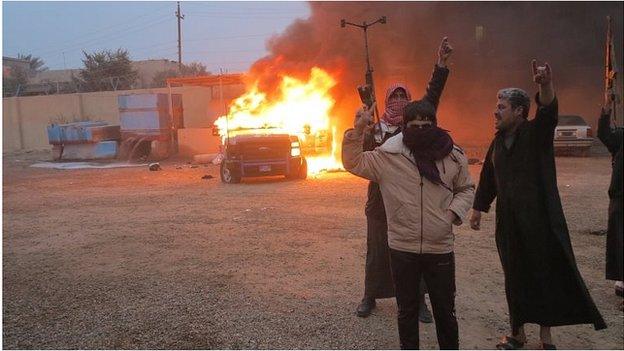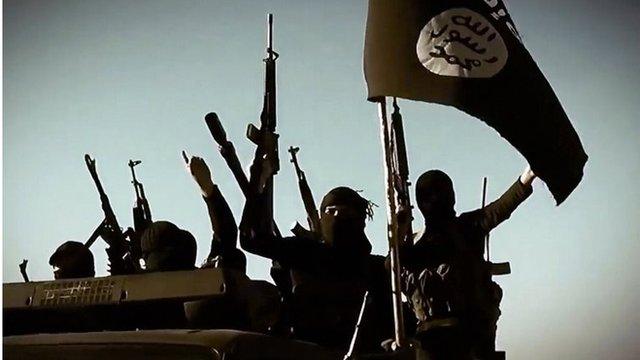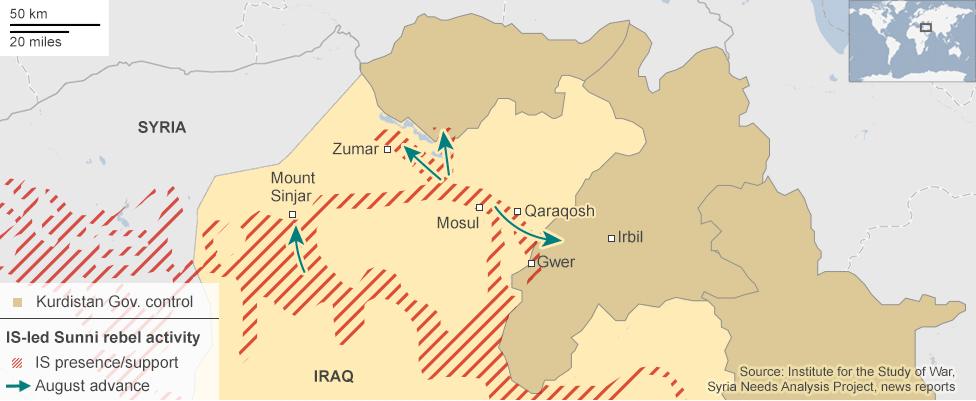Iraq crisis: Sunni rebels 'ready to turn on Islamic State'
- Published

Sunni militants initially co-operated with IS in an uprising against the Iraqi government
Stifled by the Islamic State (IS) militants in their own areas, Iraqi Sunni rebels who took up arms against the Shia-dominated government of Nouri Maliki are signalling for the first time that they are ready to turn against IS if Sunni rights are enshrined in a reformed political order in Baghdad.
The rebels, including tribal militants and former army personnel organised in military councils throughout the Sunni areas, see American and international guarantees as crucial to any such deal.
"We don't want guns from the Americans, we want a real political solution, which the US should impose on those people it installed in the Green Zone," said Abu Muhammad al-Zubaai, referring to the Iraqi political leaders who took over after the US-led occupation in 2003.
"The IS problem would end. If they guarantee us this solution, we'll guarantee to get rid of IS," said Mr al-Zubaai, a tribal leader from Anbar province speaking on behalf of the rebels, using a nom de guerre.
The tribal and military rebels, who had been fighting government forces since January, played a role in the spectacular advances scored after IS - in its previous guise as Isis - erupted into Iraq from Syria in June and captured the second city, Mosul, among other mainly Sunni areas.
But since then, the Sunni groups have been suppressed, with IS ordering them to join its own ranks or disarm.
"Living with IS is like holding burning coals in your hand," said Mr al-Zubaai. "They do not tolerate any other flag to be raised. They control all Sunni areas now."
He said tribal militants from the military councils clashed with IS at Garma, near Falluja recently, killing 16 of the Islamic radicals.
"We had to choose between a comprehensive confrontation with IS, or ceding control of that area and keeping a low profile," he said.
"We decided to stand down, because we are not ready to fight IS in the current circumstances - who would we be fighting for?"
'Nothing to lose'
Events of the past three weeks have heightened the dilemma of the Sunni rebels.
The lightning IS strikes on Iraqi Kurdistan have drawn the Kurdish Peshmerga fighters into the fray in many areas, imposing economic blockades on Sunni townships because of the IS presence there.
With the Americans and other powers becoming involved, the rebels fear they will simply be tarred as IS terrorists and the Sunni areas reduced to rubble.
"The Sunnis feel that everybody is ganging up on them, that they are targeted by everybody," said Mr al-Zubaai.
"The worst thing is to realise that you have nothing to lose any more. The situation is very bad and getting worse. It's enough to make you blow yourself up. This is where the political process has taken us.
"Our biggest concern now is a political solution. A security solution will achieve nothing. The bombing has to stop."
Sense of betrayal
Under Nouri Maliki, who remains as commander-in-chief of the armed forces in a caretaker capacity until the new government is formed, towns like Falluja and many other Sunni areas have been bombed daily, with heavy casualties among civilians.

IS does not tolerate any dissent in the areas under its control
Caught between two fires, the position of the Sunni rebels has changed sharply since the IS operation began in June.
In the early phases, they hoped a joint effort would carry the Sunni insurgency into the heart of Baghdad, ousting Prime Minister Maliki and overturning the current constitution and political order.
At that stage, they said, they would have turned on the IS militants and driven them out, as they did with al-Qaeda in Iraq in 2007.
But they feel bitterly deceived by that earlier process, and betrayed by Mr Maliki, who failed to carry out commitments given to the Sunnis and gradually drove them into a position of outright revolt after the bloody suppression of peaceful protest demonstrations from 2012.
That is why they are seeking international guarantees for a new power-sharing deal. They do not trust the Shia, and fear that under Mr Maliki's nominated successor Haidar al-Abadi, who comes from the same party, things may not change.
"Appointing someone from the same Dawa party to succeed Maliki is like appointing a Baathist to replace Saddam Hussein," said Mr al-Zubaai.
Fear of isolation
The tribal and military rebels are proposing a national reconciliation conference under international auspices, with all factions invited except for IS and also the Shia militias, which they regard as equally bad as, or worse than, IS.
A similar high-level "national accord" conference was held in Cairo in 2005, but the outcome was never followed up.
They dismiss as unrepresentative the Sunni politicians who are currently involved in intense negotiations in Baghdad over the formation of a new government under Mr al-Abadi, who has until 10 September to present his cabinet.
"These people have been involved in the political process since 2003, and they achieved nothing," said Mr al-Zubaai.
But as well as pressing for a good allocation of portfolios in the cabinet, the Sunni leaders in Baghdad have been demanding changes to the way power is shared.
If they help hammer out a deal that many Sunnis regard as fair, the rebels may find themselves with no choice but to sign up, or risk finding themselves politically isolated and physically under threat from both IS and a US-backed coalition on the ground.
Growing urgency
But the Sunni rebels, who say they can mobilise 90% of the tribes, believe that only they can tackle IS, with outside help.
The Iraqi army has shown little capability or cohesion in the field, and to defend Baghdad, Mr Maliki had to rely heavily on mobilising Shia militias and volunteers.

If such forces are thrown into battle against IS-held Sunni areas with US air support under a new al-Abadi government, the Americans might find themselves doing what they have been trying to avoid - backing one side in a sectarian civil war involving horrendous carnage and destruction.
But if the tribal and military rebels were on board, it would, by their own account at least, be an entirely different affair.
They say they have written to the Americans, but received no substantive response.
Mr al-Zubaai warned against allowing the situation to drift.
"If things stay the same, a new generation will emerge, beyond the control of the US or Iran or Syria - hundreds of thousands of young men will join up with IS," he said.
"This is a danger the West should be aware of - they have millions of [Muslim] youths, free to embrace the ideology of IS, to wave its flag in the streets."